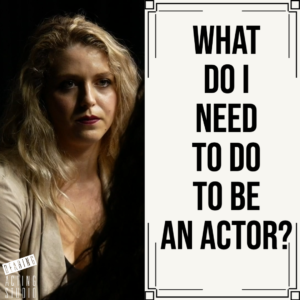Ground Yourself in your Life and Your Characters
Dearing Acting Studio director Matt Dearing and Arizona actress and model Connor Malone talk about adapting a new routine through the COVID crisis and how to keep a positive mindset.
In this episode of ‘Mornings with Matt’, it’s time to face a hard truth: You have to stop lying to yourself. Loaded statement, right? Let’s dig in.

Matt begins this episode with a great analogy for all actors and humans alike.
What is Grounding in terms of Acting?
At Dearing Acting Studio, we are big supporters of the idea of “grounding”. But what does ‘grounding’ means?
The idea of being grounded can take many forms, but we as a team both train ourselves and teach our actors to find themselves in a grounded state; both in and out of the character.
There is this special connection that can happen when an actor is rooted into themselves as the performer. It subsequently allows them to find the roots of their character.
Matt shares a bit of a magic trick here. He explains that when dressing his character, he typically begins with their shoes. Here is what comes next:
- What is it that grounds them to the stage?
- What roots do they stand on?
- How does a character’s history and back story influence the persona they show on the outside?
Interested to learn some fabulous Acting tips by the Acting guru Mathew Dearing? Here you will find some amazing tricks, work habits and Do’s and Don’ts of the acting world. 🙂
Showing Instead of Being
Lying to ourselves can be interpreted both in the acting world and the personal development world, but it encompasses all around.
On the acting side of the things, Matt has a few funny sayings trickled down to us coaches that we explain to an actor when they’re showing too much. Maybe their gestures are unjustified, movements too over the top, or their delivery is inauthentic.
We like to use the terms “putting mustard on it” or performing “on top of the scene“. Essentially this means that the actor is not being truthful to their character and not landing honestly on their audience. It’s difficult to spot, but when we overact for the camera or for the audience, we are lying to ourselves as actors. The audience knows when you are trying too hard to show off with your eyebrows! We are actually giving our character deceiving qualities that don’t apply to them.
Are actors doing this on purpose? Most likely the answer is no.
But the issue is, it can be ingrained in actors to perform and put on a show that is full of emotion and drama when in actual the audiences want to see the truth. They want to see reality portrayed in a relatable way.
Perhaps, even teaching the audience something or allowing them to make a discovery in their own life can be a great source of interest for them.
Calling Yourself Out
Coming from a personal development perspective, it’s no secret that we have all lied at some point. Whether it be big or small, we have expertly convinced ourselves at one time or another that something we say or do (that we know is untrue) is true to us in that moment. Now, let’s be clear- this is a no judgement zone. But, if you’re reading this, take a moment to be fully willing to call yourself out on your own stuff. Some may struggle with life circumstances, family history or false truths that are so deep-rooted that it becomes a part of their being. This is one of the things we coach at the Dearing Studio. How to come face to face with those seemingly harmless lies in order to find your real truths that may be buried underneath them.
Are You Really Present?
This is a BIG one. Sometimes, it can be tough to come to terms with the truth. Mindfulness and presence is seriously an art form. It shouldn’t be so hard to do, but it is.
Raise your hand or cheers your coffee mug to the screen if, you’ve ever been having a conversation with someone and took a second to check your watch or your phone.
Chances are probably you did not have intentions of being rude, but the reality is that you were no longer engaged.
Somehow, it has become OK and understandable to disconnect.
Here’s a challenge if you’re up for it. The next time you are having a meaningful conversation with someone, put 100% of your attention on them. Notice how much more fulfilled you are afterwards. Maybe you see a difference, maybe you don’t, but one thing is for sure. You may now notice them doing it to you!
Here is a bit of help to enhance your conversation challenge. 13 Simple Ways You Can Have More Meaningful Conversations. 😉
Let’s Wrap It Up
At the end of the episode, Matt speaks on a few quotes. We are quoting here one of them:
“If you want to improve, you must be content to be thought foolish and stupid” – Epictetus
When thinking about this quote, just say it out loud several times and try to figure out what it means to you. Matt makes a great inference that it simply and beautifully means “I don’t know”.
Of course! Having the willingness to admit you don’t know the answer results in unbelievable power. The issue is that we want to be right so badly that we don’t want to admit our lack of knowledge. Our pride casts a shadow on our willingness to learn and admittance to self-truth.
If we as human beings can push our ego’s aside and seek growth, there is no doubt that success will follow.
Want More Dearing Acting Studio Content? Follow us on our socials! We would love to connect with you and hear how you feel about our studio. 🙂
